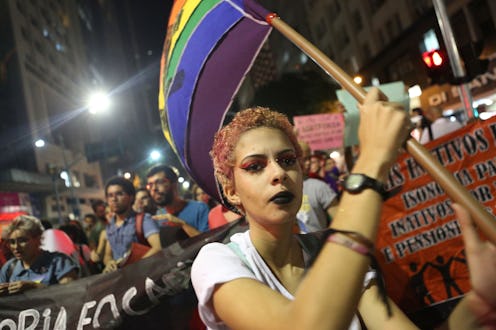News
A Chicago Federal Court Ruled Against LGBT Job Discrimination

A federal appeals court in Chicago ruled on Tuesday that existing federal civil rights laws protect LGBT employees from job discrimination, coming just three weeks after a court in Atlanta ruled the opposite. The decision from the Seventh Circuit Court of Appeals found that Title VII of the Civil Rights Act of 1964 does also prohibit discriminating against lesbian, gay, bisexual, and transgender workers — in addition to discrimination on the basis of race, color, religion, sex, and national origin — stating "discrimination on the basis of sexual orientation is a form of sex discrimination." This also means that the complaint, which was initially dismissed in July 2016, will be reinstated and that the plaintiff will have her day in court.
The case (Hively v. Ivy Tech Community College of Indiana) follows the claim from Kimberly Hively, a college professor who has been working part-time at Ivy Tech Community College in South Bend, Indiana, since 2000. Hively alleged that, despite applying for six full-time positions at the school between 2009 and 2014, she wasn't given an interview for a full-time position or renewed as a part-time employee in 2014 because she is openly lesbian.
Jeff Fanter, the college's spokesman, denied Hively's claim, saying the college "denies that it discriminated against the plaintiff on the basis of her sex or sexual orientation and will defend the plaintiff's claims on the merits in the trial court."
In the appeals court's decision, Chief Judge Diane Woods writes that her panel examined the ways rigid notions of gender "norms" allegedly created a situation that discriminated against Hively:
Hively represents the ultimate case of failure to conform to the female stereotype (at least as understood in a place such as modern America, which views heterosexuality as the norm and other forms of sexuality as exceptional): she is not heterosexual. Our panel described the line between a gender nonconformity claim and one based on sexual orientation as gossamer-thin; we conclude that it does not exist at all. Hively’s claim is no different from the claims brought by women who were rejected for jobs in traditionally male workplaces, such as fire departments, construction, and policing. The employers in those cases were policing the boundaries of what jobs or behaviors they found acceptable for a woman (or in some cases, for a man).
Additionally, the Associated Press stated that the 7th Circuit court is considered "relatively conservative." However, it also noted that out of the eight judges ruling in the majority, five were Republican appointees.
In a statement from Lambda Legal, the LGBT civil rights group that represented Hively, the group's Employment Fairness Program Director Greg Nevins called the decision a "game-changer."
In many cities and states across the country, lesbian and gay workers are being fired because of who they love. But, with this decision, federal law is catching up to public opinion: ninety-percent of Americans already believe that LGBT employees should be valued for how well they do their jobs — not who they love or who they are. Now, through this case and others, that principle is backed up by the courts.
Meanwhile, with the opposing decision in the Atlanta case and the Trump administration's back-and-forth (but mostly back) approach to LGBT rights, it's very possible that this matter will reach the Supreme Court in near future.